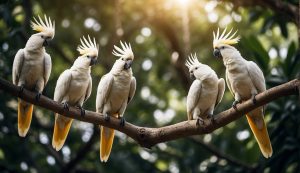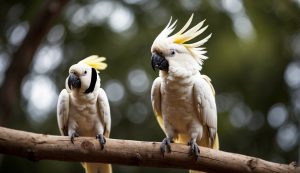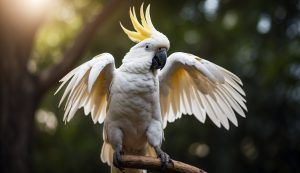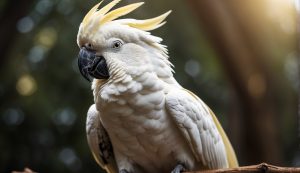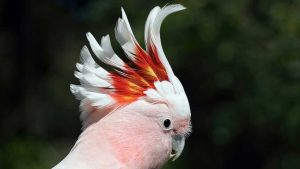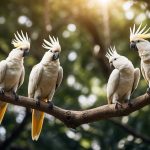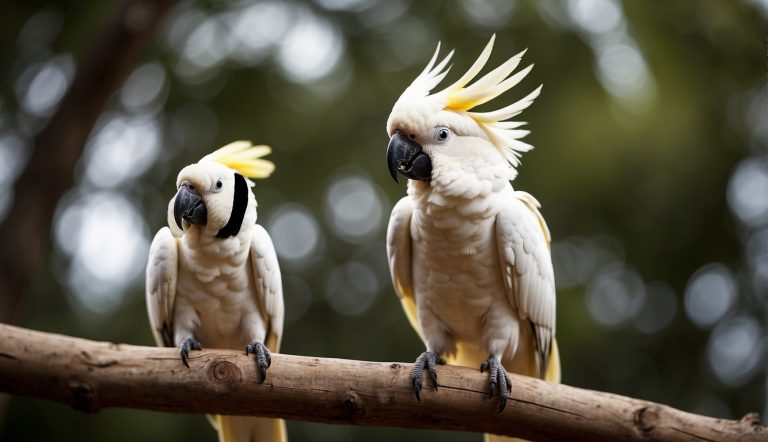Why Do Cockatoos Live So Long? Unveiling Avian Longevity Secrets

Cockatoos are known for their impressive lifespans. Some individuals live for decades, a trait that both fascinates and puzzles many bird enthusiasts and experts. These long-lived birds exhibit a slow life history.
A slow life history is characterized by a lengthy breeding season, infrequent reproduction, and low rates of breeding success. The survival of a species with such slow reproductive rates may seem counterintuitive.
However, the longevity of cockatoos is shaped by multiple factors that contribute to their life expectancy.
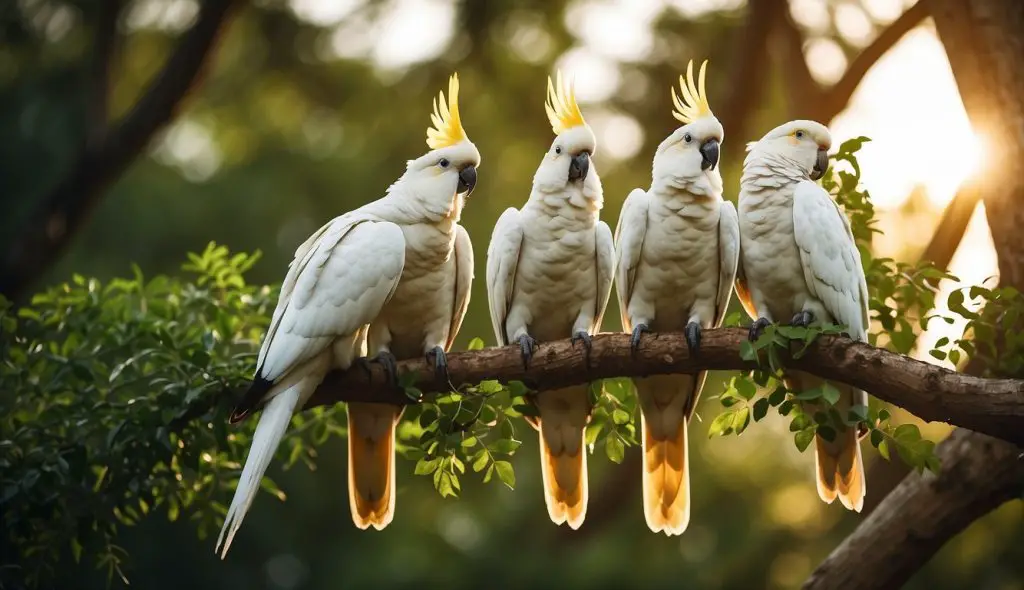
An understanding of a cockatoo’s long life begins with the basics of their lifespan and the intrinsic factors that govern it. The natural biology of these birds, which includes a slow rate of offspring production, is complemented by their diet and the care they receive.
In the wild, cockatoos consume a variety of foods that contribute to their nutritional wellbeing. In captivity, they often receive specialized diets and regular veterinary care, enhancing their potential for a long life.
Moreover, cockatoos are highly social creatures, and their environmental and social interactions play a significant role in their overall health and longevity.
Key Points
- Cockatoos live long lives due to a slow reproductive rate and careful resource management.
- Proper diet and regular veterinary care can significantly extend the lifespan of cockatoos.
- Social interactions and a stimulating environment contribute to the wellbeing and longevity of these birds.
Table of Contents
Cockatoo Lifespan Fundamentals
When I think of longevity in birds, cockatoos are a superb example that spark my curiosity. These remarkable birds generally have a longer lifespan compared to other avian species. I’ve learned various cockatoo species have life expectancies that can surpass 60 years, with some individuals living even longer under optimal care.
Life in captivity can differ significantly from the wild. In captivity, diet and environmental factors play a crucial role in the longevity of cockatoos.
A nutritious diet provides them with necessary vitamins and minerals, while safe enclosures protect them from predators and harsh conditions that they might face in the wild.
Here’s a simplified breakdown of cockatoo lifespan fundamentals:
- Average Lifespan: Often ranges from 20 to 60 years, depending on the species and living conditions.
- Oldest Cockatoo: Known individuals have exceeded 70 years in captivity.
- Key Factors Influencing Lifespan:
- Genetics: Some species are naturally predisposed to live longer.
- Diet: High-quality, varied diets correlate with longer lifespans.
- Care: Regular veterinary check-ups and mental stimulation are essential.
- Environment: Stress-free environments with plenty of space contribute to overall health.
It’s fascinating to note the correlation between size and lifespan among parrots, with larger species like cockatoos often living longer. My interest in their longevity is heightened when considering that such lifespan trends are indicative of their life-history strategies, which involve slow growth rates, late maturity, and fewer offspring.
Understanding the typical age range for these birds can be essential for potential cockatoo owners. It’s quite the commitment to care for a feathered friend who might share your life for several decades.
Diet and Nutrition
In my deep dive into why cockatoos live such a long life, I’ve discovered that their diet and nutrition play a pivotal role. Let’s nibble on the details of what these vibrant birds eat both in the wild and at home. https://www.youtube.com/embed/g1zK8jCi0dQ
Natural Diet
When I think of cockatoos in the wild, I envision them feasting on a variety of foods that nature offers. Seeds are a staple, but these birds also enjoy a selection of fruits and vegetables.
Their food choices are influenced by availability, which fluctuates with the seasons. This natural diet provides them with a balanced intake of essential nutrients, aiding their longevity.
- Seeds: A diversity of native seeds forms the foundation of their diet.
- Fruits: They relish the natural sugars and vitamins from regional fruits.
- Vegetables: Leafy greens and other veggies offer crucial minerals.
Diet in Captivity
In captivity, I’ve learned that cockatoos’ diets are a bit different, yet they still require a multitude of nutritionally rich foods to thrive. A well-rounded diet includes a mix of specialized pellets, seeds, fruits, and vegetables.
By closely mimicking their natural diet, I ensure they receive the necessary vitamins, minerals, and other nutrients.
- Pellets: These are formulated to provide a balanced diet and are often fortified with essential vitamins.
- Seeds: I offer them in moderation due to their high fat content.
- Fruits and Vegetables: I ensure a colorful array of these daily for fiber, vitamins, and minerals.
Health and Veterinary Care
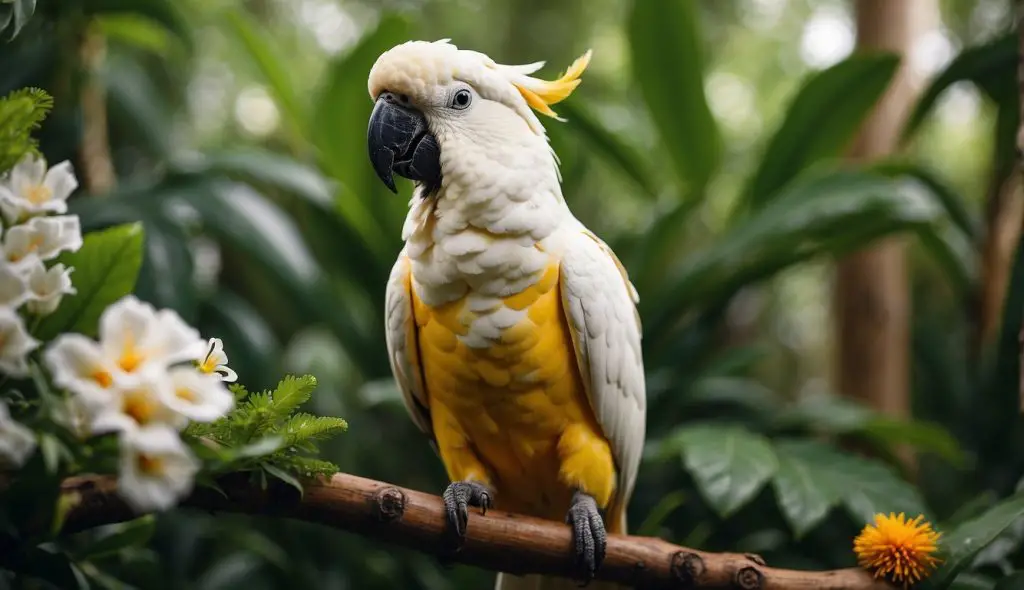
As a cockatoo owner, I know that maintaining their health through regular veterinary care is crucial. These beautiful birds can suffer from various diseases, but with proper routine health checks, they often live long, vibrant lives.
Common Diseases
Cockatoos, like all birds, are susceptible to certain illnesses. Here are a few notable ones:
- Psittacine Beak and Feather Disease (PBFD): A serious viral disease that can lead to feather loss, beak deformities, and immune suppression.
- Proventricular Dilatation Disease (PDD): Affects the nervous system and digestive tract, leading to weight loss and regurgitation.
- Bacterial infections: Such as chlamydiosis, which can cause respiratory distress.
Routine Health Checks
Regular check-ups with an avian vet are vital:
- Physical Examination: An annual check which includes weight assessment, feather and skin inspection, and beak and nail evaluation.
- Blood Tests: To detect any underlying issues that aren’t immediately visible.
- Vaccinations: Although not all are common for cockatoos, they can be essential depending on geography and local disease risks.
Environmental and Social Factors
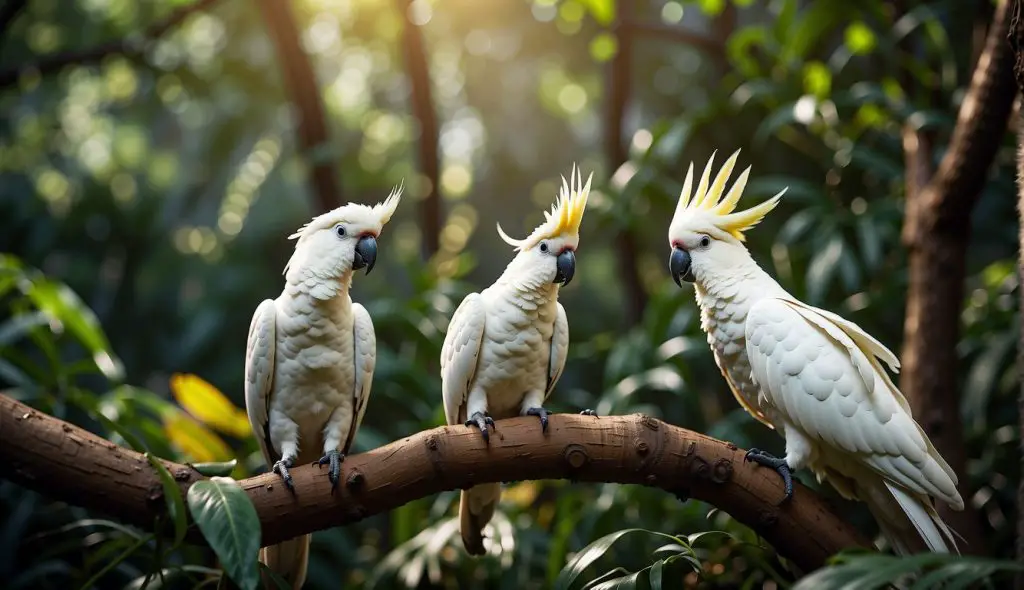
When I ponder the longevity of cockatoos, I must consider the intricate interplay between their environment and their social needs, both of which play pivotal roles in their impressive lifespans.
Habitat and Exercise
In the wild, I’m aware that cockatoos benefit from expansive environments that necessitate constant flying and foraging. This natural exercise regimen is crucial for their physical health and is often imitated in captivity with larger cages and free-flight opportunities.
Here’s what an ideal habitat setup would include to mimic their natural environment and encourage exercise:
- Size of Cage: At a minimum, spacious enough for wing spreading and some flight.
- Toys/Perches: Offer different textures and materials for foot exercise and beak health.
- Exercise Time: Daily out-of-cage time is essential for flight and exploration.
Social Interaction and Mental Health
Cockatoos are social birds in their genera, and their mental health is greatly influenced by social interaction, whether with other birds or with humans. The right amount of stimulation can prevent stress and behavioral problems.
Here’s a snapshot of the role social interaction and mental health play:
- Flock Dynamics: In the wild, cockatoos are part of a flock, where they learn, play, and communicate.
- Human Interaction: Regular, meaningful interactions are crucial when they live with me.
- Mental Stimulation: Puzzles, foraging toys, and training can mimic wild cognitive challenges.
- Stress Reduction: Social bonds and mental engagement help prevent stress in captivity.
Frequently Asked Questions
In this section, I’ll tackle some of the common curiosities about the lifespans of cockatoos and other parrots.
I’ll look at their life in captivity versus the wild, factors that influence their longevity, and special care guidelines to ensure they lead full, healthy lives.
How do the lifespans of captive parrots compare to those in the wild?
Captive parrots often live longer than their wild counterparts due to regular veterinary care, a balanced diet, and protection from predators. In the wild, cockatoos face challenges that can reduce their lifespan, such as scarcity of food, disease, and environmental hazards.
What factors contribute to the longevity of parrots?
The lifespan of a parrot is influenced by several factors including genetics, diet, exercise, mental stimulation, and health care. A well-enriched environment and proper nutrition play crucial roles in their longevity.
What is the average lifespan of a cockatoo in captivity?
A cockatoo in captivity can live anywhere from 40 to 70 years. Some species can even reach up to 80 years when given optimal care. Regular vet check-ups and a suitable living environment are key to achieving this extended lifespan.
What bird species is known to have the longest lifespan?
The bird species known for the longest potential lifespan is the large parrot. Among these, macaws and cockatoos are notable. The latter often lives several decades, frequently outliving their human caretakers.
Are there any special care requirements that help extend the life of cockatoos?
Yes, cockatoos need a diet rich in fruits, vegetables, and nuts to mimic their natural intake. They also need plenty of social interaction and mental challenges. These prevent boredom and depression, which can affect their health and lifespan.
What record is there for the oldest known cockatoo?
The oldest known cockatoo was a Major Mitchell’s cockatoo named Cookie. She lived to be 83 years old at the Brookfield Zoo in Chicago.
Cookie’s longevity is attributed to dedicated care and a high quality of life.

